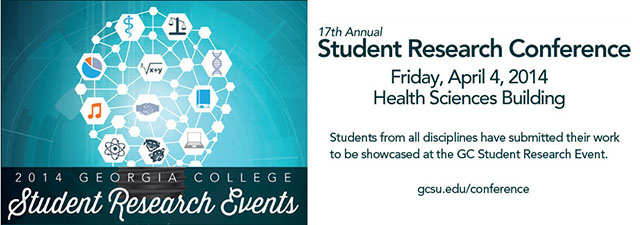
Event Title
Analytical techniques using GC/MS in the detection of pharmaceutical pollution of surface water
Faculty Mentor
Catrena Lisse
Keywords
Catrena Lisse
Abstract
Undergraduate students at Georgia College and State University are investigating the presence of pharmaceuticals in local water using high-performance liquid chromatography and gas chromatography/mass spectrometry. Possible pharmaceutical byproduct pollutants, xenoestrogens, are synthetic molecules that mimic the hormone estrogen when introduced to the human body. These byproduct compounds can be present in human waste after the consumption of pharmaceuticals, which leads to the contamination of sewage. Although wastewater is treated by sewage treatment facilities there are minimal methods for removing pharmaceutical byproducts, which increase the potential for contamination of surface water areas such as lakes and rivers. A collaborative group of undergraduates are monitoring and analyzing various surface water areas in middle Georgia for xenoestrogens using HPLC. Currently, the main focus of the project is to develop analytical procedures for GC/MS analysis to compare with the HPLC results. The presentation summarizes the experimental design and preliminary results of the GC/MS analysis.
Session Name:
Poster Presentation Session #2 - Poster #54
Start Date
4-4-2014 12:15 PM
End Date
4-4-2014 1:00 PM
Location
HSB 3rd Floor Student Commons
This document is currently not available here.
Analytical techniques using GC/MS in the detection of pharmaceutical pollution of surface water
HSB 3rd Floor Student Commons
Undergraduate students at Georgia College and State University are investigating the presence of pharmaceuticals in local water using high-performance liquid chromatography and gas chromatography/mass spectrometry. Possible pharmaceutical byproduct pollutants, xenoestrogens, are synthetic molecules that mimic the hormone estrogen when introduced to the human body. These byproduct compounds can be present in human waste after the consumption of pharmaceuticals, which leads to the contamination of sewage. Although wastewater is treated by sewage treatment facilities there are minimal methods for removing pharmaceutical byproducts, which increase the potential for contamination of surface water areas such as lakes and rivers. A collaborative group of undergraduates are monitoring and analyzing various surface water areas in middle Georgia for xenoestrogens using HPLC. Currently, the main focus of the project is to develop analytical procedures for GC/MS analysis to compare with the HPLC results. The presentation summarizes the experimental design and preliminary results of the GC/MS analysis.

